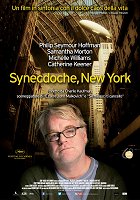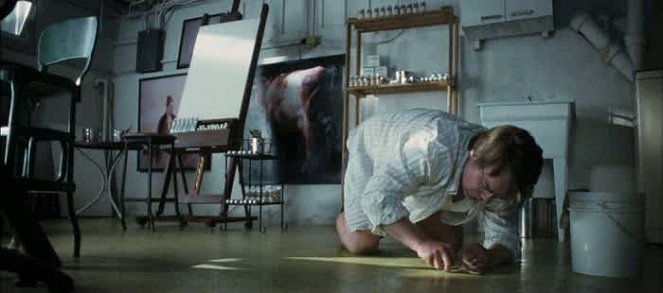Reżyseria:
Charlie KaufmanScenariusz:
Charlie KaufmanZdjęcia:
Frederick ElmesMuzyka:
Jon BrionObsada:
Philip Seymour Hoffman, Jennifer Jason Leigh, Michelle Williams, Samantha Morton, Catherine Keener, Emily Watson, Dianne Wiest, Hope Davis, Robert Seay (więcej)Opisy(1)
Theater director Caden Cotard (Philip Seymour Hoffman) is mounting a new play. His life catering to suburban blue-hairs at the local regional theater in Schenectady, New York is looking bleak. His wife Adele (Catherine Keener) has left him to pursue her painting in Berlin, taking their young daughter Olive with her. His therapist, Madeleine Gravis (Hope Davis), is better at plugging her best-seller than she is at counseling him. A new relationship with the alluringly candid Hazel (Samantha Morton) has prematurely run aground. And a mysterious condition is systematically shutting down each of his autonomic functions, one by one. Worried about the transience of his life, he leaves his home behind. He gathers an ensemble cast into a warehouse in New York City, hoping to create a work of brutal honesty. He directs them in a celebration of the mundane, instructing each to live out their constructed lives in a growing mockup of the city outside. The years rapidly fold into each other, and Caden buries himself deeper into his masterpiece, but the textured tangle of real and theatrical relationships blurs the line between the world of the play and that of Caden's own deteriorating reality. (oficjalny tekst dystrybutora)
(więcej)Recenzje (3)
Now I finally understand why Kaufman wanted to shoot this by himself. The movie is simply too personal. But why he’s still alive, I have no idea. Because if this really is based on his own life, logically he should have committed suicide long ago. Otherwise it’s actually the most normal and down-to-earth piece Kaufman ever wrote. Which hardly means that it’s anywhere near to being normal. It is not normal, but it is a damn honest and probably the most depressing movie debut ever. But then again... Then again, this applies only to half of the movie. I am going to remain graciously silent about the second half, because I’d have to be very vulgar to air my disappointment at how you can ruin something SO perfect. It’s amazing I didn’t commit suicide after witnessing that.
()
Charlie Kaufman is a very unique screenwriter. His films like "Being John Malkovich", "Eternal Sunshine of the Spotless Mind" or "Adaptation" are very unique movies, just like highly acclaimed films. The film "Synecdoche, New York" is at first glance - well, rather at second glance - Kaufman's own work, but this time he went a little further and sat in the director's chair. Obviously, he quite liked it, because he is preparing another film in which he plans to direct as well. "Synecdoche, New York" is a truly peculiar film. You have to watch it very carefully to actually understand at least a little bit what the author is even talking about. Kaufman cast Philip Seymour Hoffman in the lead role, who is a guy with undeniable acting talent. He proves it with every other film. "Synecdoche, New York" is no exception, but the screenplay is once again the main character. Hoffman played a theater director whose play begins to grow strangely. At first, it seems that Kaufman has for the first time made something normal, but over time it becomes clear that the film is much more complicated than it seemed at first. As the running time progresses, the levels of personal life, work life, and fantastic life begin to intertwine in such a way that you no longer really know who is the actor, who is the director, and who is actually who. Is this just a theater play? Is it a true record of an aging man's life? Or is it something completely different? Kaufman uses theater in a way that is hard to believe. He transfers human life onto the stage and lets it play out. The director is essentially a role of god, letting the play flow as his life should flow. It's not a perfect work, but it will surely stir your mind. Or completely numb it. It's a film that you have to open yourself to. If you do, you can have an experience that will not easily fade away. More: http://www.filmovy-denik.cz/2012/12/sherrybaby-lets-dance-unesena.html
()
The psychological drama Synecdoche, New York can be seen as a kind of cinematic meditation that says a lot not only about the life of Charlie Kaufman himself, but also about Philip Seymour Hoffman and, by extension, all of us mere mortals. It is sad, full of anxiety, gloomy to depressing, but in many ways very true. And last but not least, it's quite hard to digest and to watch. (75%)
()

